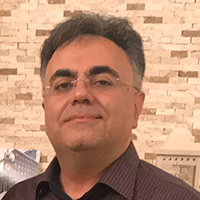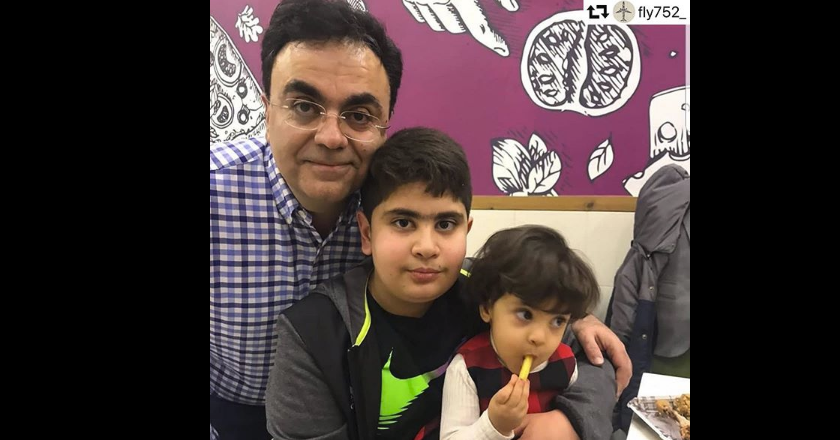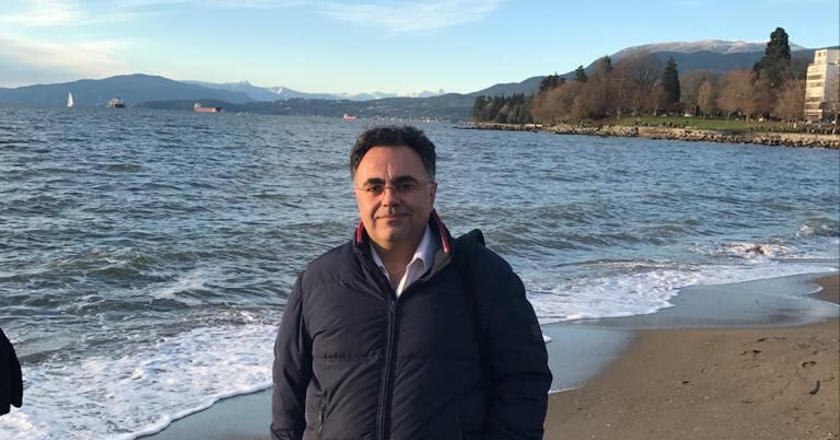Kasra Saati
Kasra, the Lost Future of Danial and Diana
In our pictures, I can no longer find our laughter. Two missiles have passed over our lips.
I can’t make our tears of joy fall. Two missiles have passed over our eyes.
In my mind, I can’t event build up a stable image of his being and absence. Two missiles have stolen him away.
In the headlines of all the Canadian newspapers, you see a cipher of his name. In all the news websites. In the list of those lost, in the midst of all those lives that collapsed. As part of that massive red remorse on the pages of cold newspapers.
My eyes now detect the shape of every letter that make up his name: Kasra Saati.
My father’s name is Kasra Saati.
And who am I? Danial Saati. Diana Saati. I am half myself, half my father.
The missiles don’t let us be. They have penetrated our sleep. I wake up breathing hard and call for him without moving my lips. My sister calls for him with her tears. At night before, when we had nightmares, we only had to say his name once for him to come. Now that our lives have become nightmares, how come he doesn’t show up when we shout his name for a thousandth time? He had a karate belt and could make all my imagined enemies disappear in my mind. How come he doesn’t come to help us now?
How can we ask him our questions now? How can we ask him, ‘Baba, what is death’?
Baba, how could the missiles target an aircraft that was to bring your embrace to our house?
In your suitcase, what did you have other than souvenirs from Hamedan and Yazd and your books?
My sister doesn’t speak but her eyes ask a question: How could someone who is all of your past be wiped away from your future?
I turn my eyes to look at the walls of his room. At his degrees. At his accolades and scientific certificates. At all the wisdom he took with him to the heavens. I shut my eyes.
Tomorrow I turn 18 and my face is red from love. How could my father not see our cheeks full of love?
I look at the pictures. I ride my bike; I have my helmet on; I am striking a pose; I am laughing. My father is in front, taking my picture and also laughing. The way he stands there, you can see his passion for life. Behind me is a rainbow, also sporting a smile as big as the sky. That picture is full of laughter and life. I look at it closely. I go over it again. I try to strike a pose. I now see the void left by father. I now see the passion of life replaced by the remorse of his absence. Behind me, the sky is filled with the falling pieces of my dad’s suitcase. I shut my eyes and press my eyelids onto each other.
Tomorrow I will graduate. In the crowds, I’ll look for my father. None of those standing, coming, going, talking and hugging will be my father. But my father will be sitting on every empty chair. Instead of talking to him and telling him of university, my classes and all that I have learnt, I will whisper: My father was an industrial engineer. All his colleagues and friends have nothing but praise for him.
Tears come down from my eyes. My voice is heard only by myself. My father worked in Iran for years, with commitment and love. He read books all the time. Every day he would look for something new to learn. He knew the meaning of every English word I ever asked about. Whenever I had a problem with computers, he’d solve it quickly. He was always full of life.
I put my two hands on my forehand and press down on my head with my fingers.
Tomorrow I’ll be 30. Tomorrow I’ll be 40. Tomorrow I’ll be 50. My hair will be white. I will wear my father’s glasses. Sometimes my face will be thinner than before. Sometimes I will color my hair; I’ll change its style. But he will remain as he was. Exactly as he was. I’ll tell my kids: Your grandfather was a great human being. The best human being I knew.
With his love for Iran, he bore the brunt of migration. He left to build a better future for us. Half of his heart was for Iran, the other half for us. When the world recession hit, he had so much knowledge and experience that he quickly found his way into the best companies in Canada. One night I heard him from another room. “Diana is small and delicate,” he said. “Let’s go to Iran and we will come back when she grew up a little.”
We left. We stayed and he decided to go back to work in Canada. And a day before his return, they shot his plane down. They took him away from the world. Gone was the path he had trodden, gone were all the words and all the life he carried in his mind and heart.
But we didn’t give up. We kept repeating a question: “Why did you shoot the airplane, the fathers, the mothers, the children, the embraces, the laughter, the minds, the hearts?”. We asked again and again, until justice woke up from its slumber.
A child points a finger and asks: “What are the two holes in your heart?”
“They shot two missiles at it,” I say.


